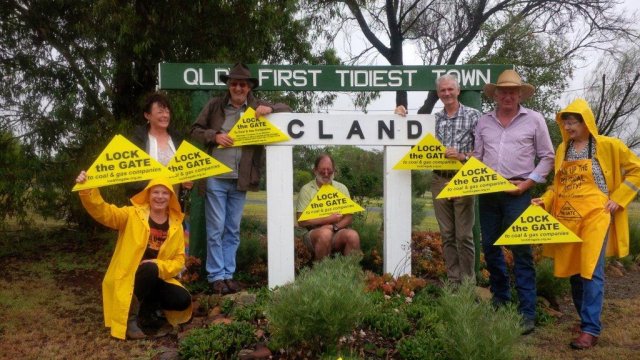
Opponents of the Stage 3 expansion of the Acland coalmine in the Darling Downs in Queensland have called on the Palaszczuk government to make good on its campaign promises and reject the application by New Hope Coal. This comes in the wake of revelations that the mining company New Hope Group, would receive about 77% of royalties, while the state would get only 7%.
In response to a request for information from Independent MLA Peter Wellington, New Hope chief executive Shane Stephan in May revealed the company’s estimated cut from Acland: “The payment of royalties is very hard to calculate,” Stephan wrote. “However, an estimate can be made by considering the ownership of land and strata title of coal blocks.”
This showed an “estimated average royalty split” of 77% to New Hope, 16% to other landholders and 7% to the government.
New Hope has taken advantage of a pre-1910 loophole, which only applies to a fraction of mines in Queensland, by buying up most of the land at Acland.
Activists estimate Acland’s rare status means the state would lose out on $450 million for Stage 3 and almost $1 billion over the life of the entire mine.
In December last year the Coordinator-General gave approval for Stage 3 of the New Hope mine. This became an issue in the February election campaign, which resulted in the defeat of the Newman government. Under the memorandum of understanding between Wellington and Labor, which permitted Labor to form a minority government, Labor committed to:
· re-introduce the $1000 donation disclosure threshold, and establish an inquiry into political donations, including the $1million from New Hope Coal’s parent company to the Liberal National Party;
· reinstate the right to object and appeal to mining developments for communities, residents and individuals; and
· scrutinise the Acland mining approval processes, including a review of the Coordinator-General’s approval.
The Palaszczuk government has failed to deliver on these commitments. Amending legislation to restore third party objections to mining applications may not be implemented in time for community input into the Acland Stage 3 application process.
A group of 23 organisations wrote an open letter to the premier on June 23 calling on her to reject the New Hope Coal application. The letter drew attention to a range of issues and concluded: “Queenslanders are already feeling the impacts of global warming and will stand to lose much if prime agriculture land is lost to coal mining.
“Furthermore, there are far more potential jobs in agriculture based on preserving quality cropping land and renewable energy for the long-term rather than short-lived mining jobs.
“We the undersigned believe that it is in all our interests to say NO to Acland Coal Mine Stage 3 expansion. We must keep coal in the ground and shift to clean safe energy options if we want to protect our families and the Queensland we know and love.”
In a statement issued on July 5 the Lock the Gate Alliance called for the premier to immediately reject the Acland Stage 3 application. In an ABC radio interview, Lock the Gate president Drew Hutton said parliament should be immediately recalled to approve changes to the State Development and Public Works Organisation Act 1971 to allow third party objections to Acland Stage 3.
Hutton said that without legislative change the only inquiry into the process would be if an application is made to the Land Court.
The Oakey Coal Alliance has put forward an alternative plan for the region in the Acland Sustainable Energy Plan, which concludes: “There are far more sustainable options for the future of the fertile Acland, Oakey and Jondaryan region than coal mining.
“This report provides a pathway to a sustainable land management plan for the Acland region. In particular, it maintains the soils and food production potential that this region offers. It offers farmers the potential of a more stable income by diversifying food production with solar electricity production.
“This model of development could be implemented across Australia. It is far more sustainable economically, socially and environmentally than the current approach that has been termed ‘quarry vision’.”
Like the article? Subscribe to Green Left now! You can also like us on Facebook and follow us on Twitter.